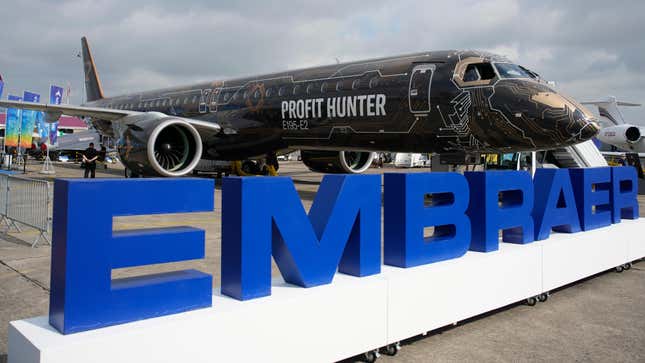
In This Story
A possible competitor to Boeing and Airbus continues to bide its time.
Reuters reports that Brazilian planemaker Embraer is relishing the possibility of taking a little business from the commercial airline duopolists while they struggle to fill orders from their airline customers. The outlet says CEO Francisco Gomes Neto told reporters at the company’s headquarters that he thinks his planes would be a “great solution” for carriers in a bind because it can build jets more quickly.
There has been a lot of public complaining by airline executives that Boeing is taking too long to deliver planes, a complaint that even preceded the current troubles brought about by a 737 Max 9 door plug blowout. But Airbus has also been falling behind thanks to problematic engines from one of its suppliers; Spirit Airlines expects to be compensated as much as $200 million for all the trouble caused by the resulting recalls.
Embraer manufactures planes that are smaller than the 737 Max and Airbus A320neo jetliners that carriers like, but there have been suggestions that Embraer might look into stepping up into the next weight class. That would be a distant prospect, though. During an earnings call last month, Air Lease Corp. CEO John Plueger said that it’s not a simple prospect when asked about new market entrants.
“Any new manufacturer, it’s going to take years for the certification and delivery of new aircraft, because any new aircraft will be subject to the heightened regulatory scrutiny we’re seeing today, both from the [Federal Aviation Administration] and [the Aviation Suppliers Association],” Plueger said. “So the real key question — even if it happens — is it’s going to take some time. It’s going to take us a fair amount of time. This is not even a two- to three-year thing. This is a well-beyond-2030 timescale, if at all.”
For what it’s worth, Gomes Neto downplayed any possible forays into building larger planes. “We are always making studies about opportunities,” he told Reuters, “not only in commercial but in other business unites as well, but at this point of time we don’t have concrete plans.”